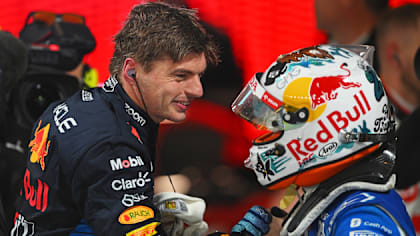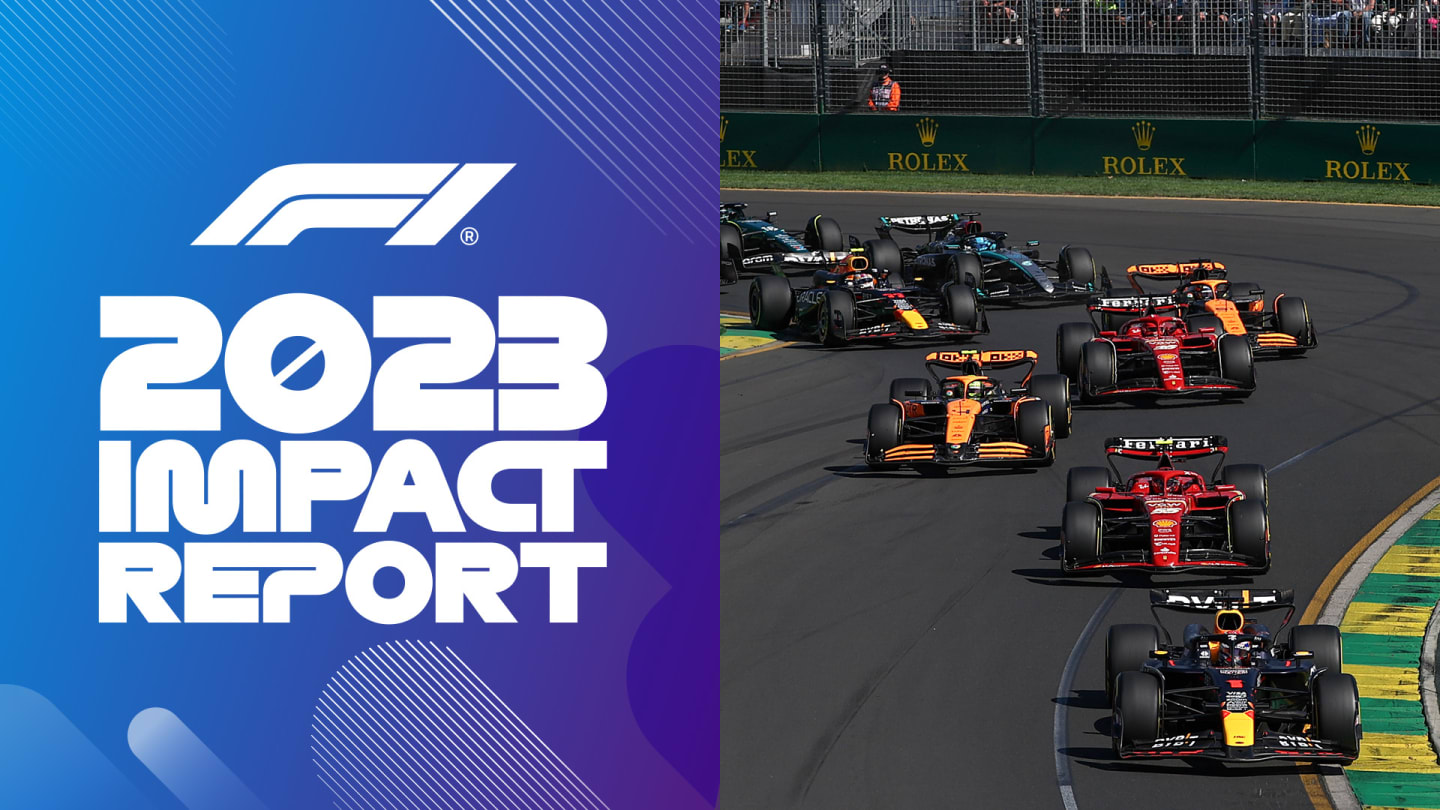
News
F1 makes ‘significant progress’ in sustainability as first Impact Report released
Share

Formula 1 has released its first Impact Report, revealing that the sport is on target to meet the goals set out in its sustainability strategy.
The comprehensive report shows how the strategy is being successfully delivered through F1’s Environmental, Social and Governance (ESG) activities, plus the latest carbon footprint calculations show a 13% reduction in the sport’s carbon footprint compared to 2018.
EXPLAINED: What is the F1 Impact Report and why does it matter?
As carbon data from 2023 continues to be collated and calculated, today’s 63-page document reveals F1’s carbon footprint data from the 2022 season – the first representative year to be measured following the COVID-19 pandemic – and includes details on how the sport will continue to deliver and make further progress.
“Sustainability is one of the most important factors to us not only as a sport, but as a business.” said Stefano Domenicali, President & CEO, Formula 1. “It is no longer enough for us to simply deliver great action and wheel-to-wheel racing on the track, we need to ensure that we are doing so in a sustainable way so our sport can thrive long into the future.
2023 F1 Impact Report
“F1 has been innovating and influencing wider society for over 70 years, and we’ve seen how the great minds and technology of the sport have had a positive impact in many different spaces, and now we have turned that expertise and insight to sustainability.
“We are a global sport with over 700 million fans around the world, which gives us a great platform to create change and influence those watching and engaging with F1 to take action and leave their own positive legacy.
“Over the past four years we have made significant progress and we remain very focused on our goals, and I’m excited to see the impact we can have.”
The 2018 baseline was confirmed back in 2019, when F1 launched its sustainability strategy with the goal to achieve Net Zero Carbon by 2030, leave a legacy of positive change wherever it races, and build a more diverse and inclusive sport.
F1 made a commitment to cut carbon emissions by a minimum of 50% versus 2018, a target set using science from the Intergovernmental Panel on Climate Change (IPCC) and its definition of Net Zero emissions, and following the guidance set by the Greenhouse Gas Protocol.
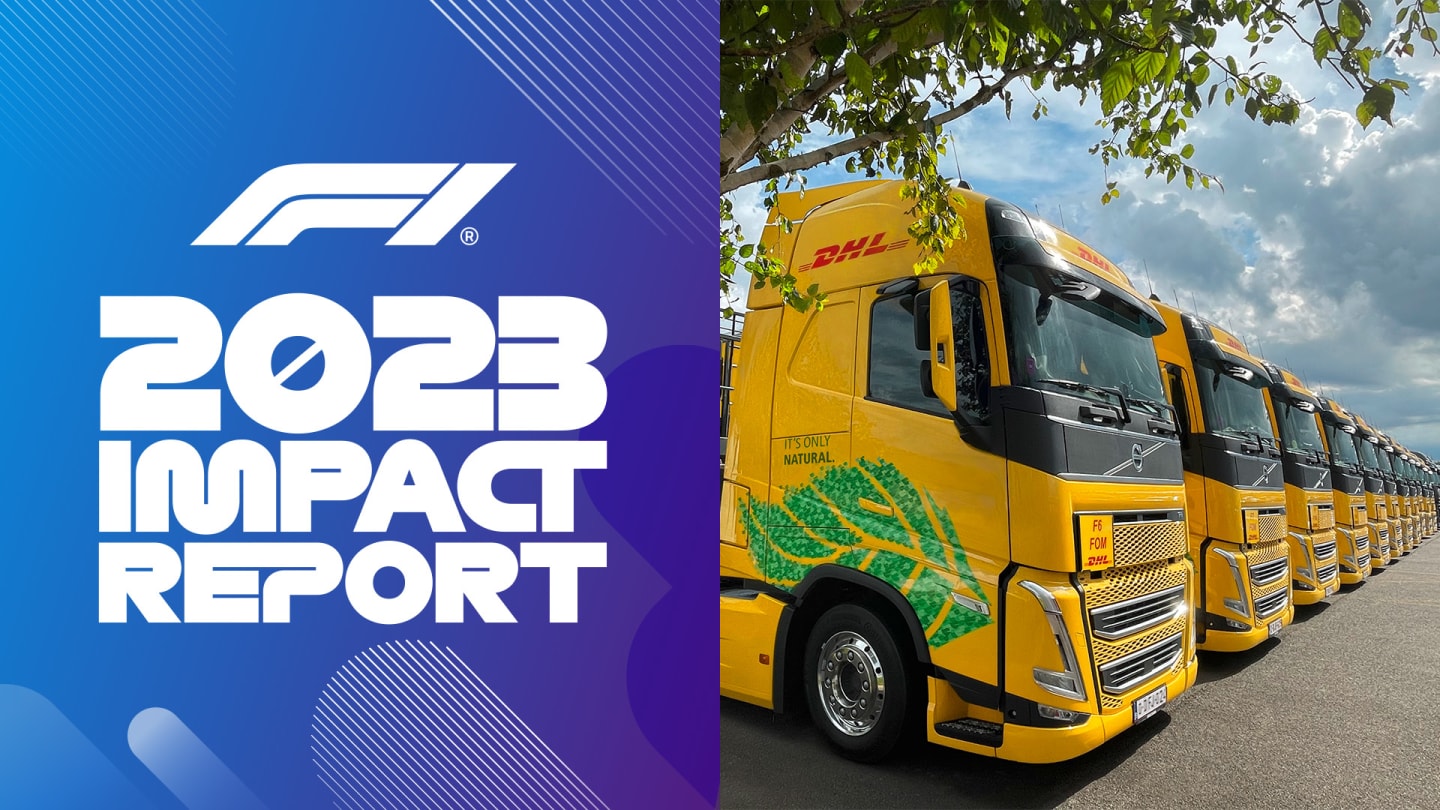
DHL's biofuel-powered trucks reduced logistics-related carbon emissions by an average of 83% during the European season
The report sets out the sport’s next steps to further reduce its carbon footprint and achieve the remaining 37% reduction – including a focus on the logistics sector that accounts for almost half of the total footprint.
Formula 1, the F1 teams, race promoters and partners, have been reducing carbon emissions by transitioning to renewable energy and making logistical shifts towards remote operations and sea freight. While the report’s carbon data reflects the 2022 season, it also highlights several environmental activities from 2023 as progress continued with significant new innovations.
READ MORE: Formula 1 becomes first motorsport competition to use Pirelli FSC-certified tyres
For example, all F2 and F3 cars trialled a 55% sustainable fuel in partnership with Aramco, as Formula 1 took another step towards the use of 100% sustainable fuel in F1 cars in 2026, alongside the sport’s new power unit regulations.
A new fleet of DHL biofuel-powered trucks also reduced logistics-related carbon emissions by an average of 83% during the European season.
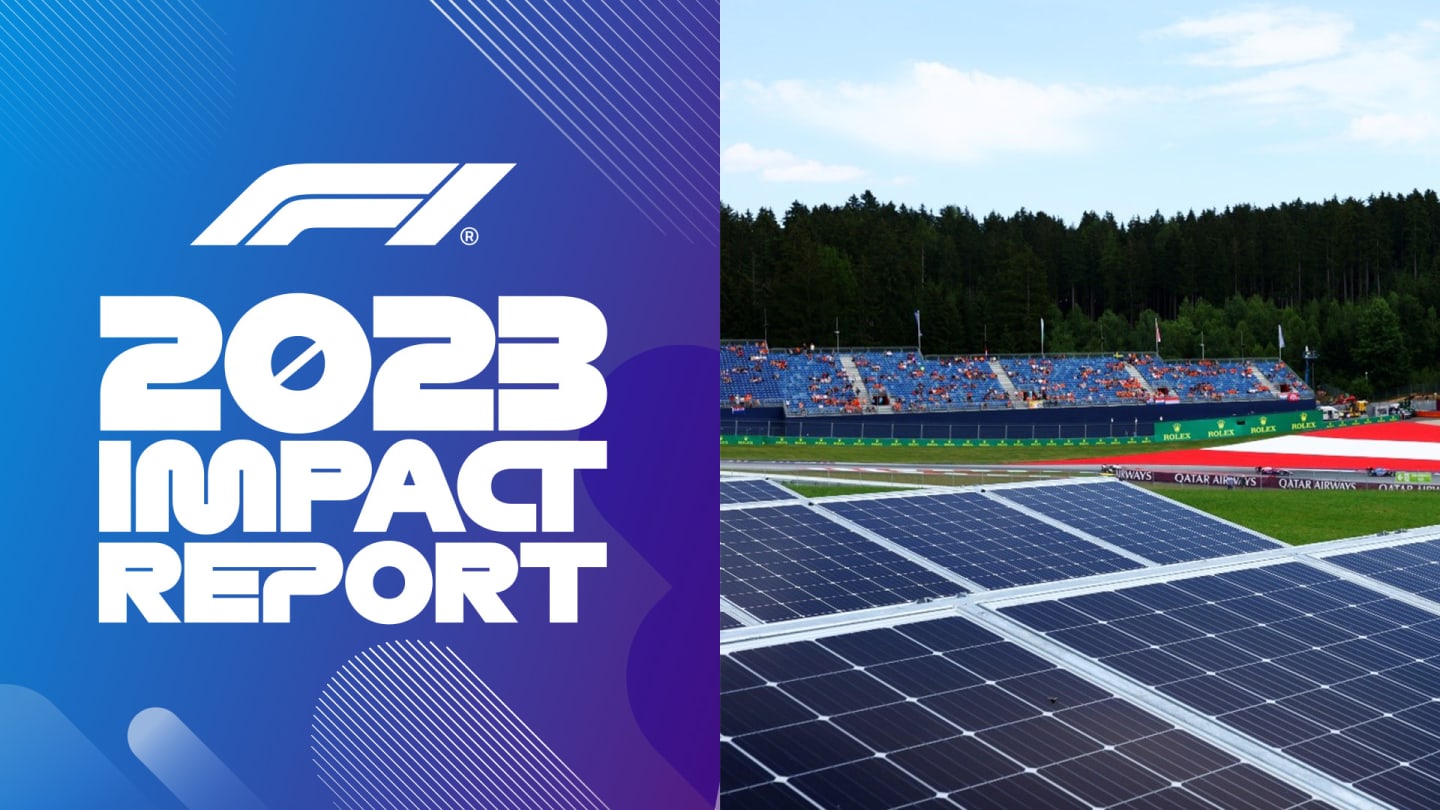
The Austrian Grand Prix reduced the carbon emissions within the Paddock, Pit Lane, and broadcast areas by more than 90% in 2023
Over 75% of promoters used renewable energy sources to power aspects of their event in 2023, ranging from trial activations to the entire Grand Prix weekend, compared to 50% in 2022. Specific examples include:
- The Austrian Grand Prix reduced relevant emissions by more than 90% in the pit lane, paddock, and broadcast compound through a next-generation energy pilot. That trial is expanding in 2024 and beyond.
- The solar farm at the Bahrain International Circuit produced 5.28 MW of clean energy between the 2022 and 2023 Grands Prix – enough renewable energy to cover all the circuit usage for F1 with significant capacity to spare.
- The British Grand Prix was fully powered by green energy alternatives. This included 2,746 solar panels and the use of Hydrotreated Vegetable Oil (HVO) fuel in all temporary generators.
READ MORE: How Singapore is setting the trend for sustainable night racing on the F1 calendar
Away from energy, the Las Vegas Grand Prix also launched a first-of-its-kind water conservation programme in efforts to implement technologies that can reduce, and eventually offset, outdoor water consumption at large-scale sporting events.
2023 saw Formula 1 retain its FIA Three-Star Environmental Accreditation, the highest level of environmental sustainability recognition from the sport’s governing body, while becoming the first motorsport championship in the world to have all member teams achieve the same status.
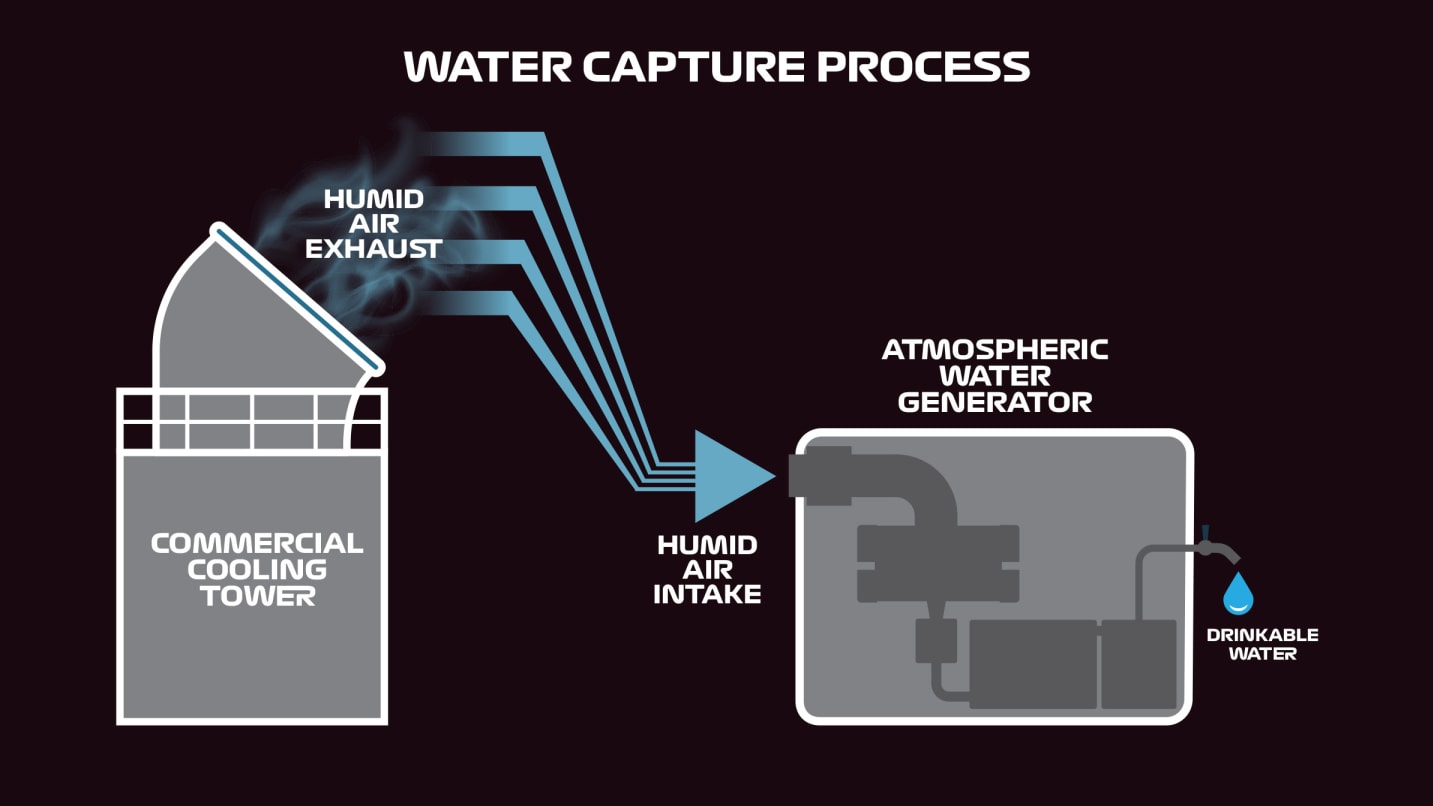
The Las Vegas programme can reduce, and eventually offset, outdoor water consumption at large-scale sporting events
The report also features F1 activities delivered throughout 2023 that reflect the sport’s diversity and inclusion efforts. These include the launch of F1 ACADEMY to help discover and develop young female talent on their journey to the elite levels of motorsport, and F1 ACADEMY Discover Your Drive, a global initiative to increase the pipeline of talent entering motorsport focusing on four pillars: youth engagement, talent identification, participation and progression, and community.
At the grass roots level, following the launch of the first F1 ACADEMY Discover Your Drive programme in collaboration with Motorsport UK and TeamSport, the number of girls qualifying for the British Indoor Karting Championship (BIKC) local finals increased by 265% in 2023.
WATCH: The vital impact of the F1 Engineering Scholarship Programme
Formula 1 continued supporting engineering students through its Engineering Scholarship Programme, with the first ten scholars taking up placements at F1 teams throughout 2023, as well as inspiring the next generation with education initiatives including STEM events and career insight days involving more than 350 students across the United Kingdom.
Opportunities for people from underrepresented backgrounds to access the world of Formula 1 continued, with a formal diversity and inclusion working group created and work with partners, such as Lewis Hamilton’s Mission 44, to create inspiring opportunities at Grands Prix around the planet.
The full report can be viewed by clicking here.
YOU MIGHT ALSO LIKE
News Formula 1 to race in Monza until 2031 with new six-year extension
News ‘I’m really proud of him’ – Verstappen’s race engineer Lambiase on Dutchman’s ‘real strength’ in the wake of his fourth championship
News ‘He’s a deserving champion’ – Verstappen’s fellow drivers pay tribute to the Dutchman after securing his fourth title
News What is the weather forecast for the 2024 Qatar Grand Prix?



